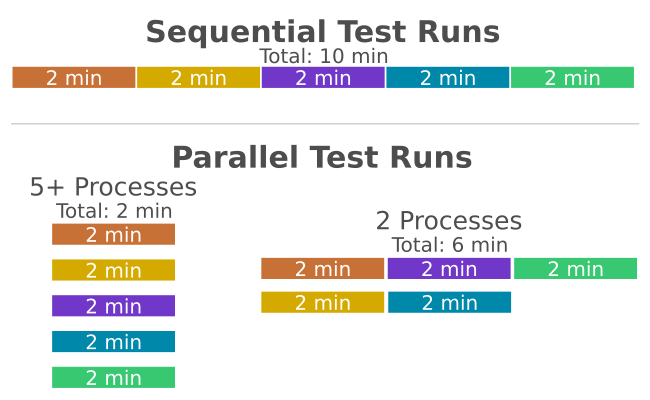There comes a time in the life of every Ruby on Rails project where you and your team will end up with long-running tests. Rails tests can contain factories, fixtures, and numerous setup procedures before tests are executed, and all of these can contribute to significant slowness in the test runs.
I’ve seen four ways of dealing with slow-running tests in Rails:
- Start deleting tests (or mark them as skippable): the drawback is that your test coverage drops, and you may end up with more bugs
- Use more integration tests rather than unit tests: this exercises a lot of code paths so test coverage won’t drop too much, but in the end, most developers will write integration tests that exercise the “happy path”
- Run your tests in parallel
- Run only the tests that were most likely to be affected by recent code changes
The latter two methods are much better than the first two.
My favourite so far is #3 because it still runs all of the integration and unit tests that you have, but makes use of the fact that you can offload the work of running tests to multiple machines. Everyone now has access to multiple machines through AWS (Amazon Web Services), Microsoft Azure, or RedHat’s cloud. You can run parallel tests on your local development machine.
Run Your Ruby on Rails Tests In Parallel (Rails 3, 4 and 5)
- Parallel_tests is a Ruby gem for Ruby on Rails that lets you make multiple test runs in parallel.
- How to set up parallel tests in RSpec across multiple machines using Jenkins CI.
The idea is that each test file will be run in a separate process.

If you have 5 tests that have a duration 2 minutes, in sequential runs it will take 10 minutes to run the whole test suite. If you have 5 processes available for parallel runs, it will only take 2 minutes to run them.
That’s a huge difference, meaning you can conduct 30 test runs in an hour rather than 6.
Rails 6: Parallel Testing is Built-In
The latest version of the Ruby on Rails framework, Rails 6, has parallel testing built into its core. It uses threads or processes for parallel test runs. The way it works is that you re-open the ActiveSupport::TestCase and add just one method call to it:
class ActiveSupport::TestCase
parallelize(workers: 2)
endAdditionally, you can override the number of parallel workers by providing the environment variable PARALLEL_WORKERS when you run “rails test” like this:
PARALLEL_WORKERS=5 rails testSplitting RSpec test files into multiple files
However, some of your Rails tests may take longer; within the spec, you could have multiple test cases and contexts that are taking too long. For instance, one test context with a few tests could take 1 minute, while the rest of the test cases in that file only take 10 seconds. At that point, you can split the long-running test context into multiple files.
Here’s an example of how that might look:
# spec/my_controller_spec.rb
describe MyController do
context 'Slow tests' do
it 'runs slowly #1' do
# ...
end
it 'runs slowly #2' do
# ...
end
end
context 'Faster part of the test suite' do
it 'runs in 10 seconds or less' do
# ...
end
end
end

And now here’s how we could split that controller RSpec test file into multiple files.
# spec/my_controller_spec.rb
describe MyController do
context 'Faster part of the test suite' do
it 'runs in 10 seconds or less' do
# ...
end
end
end
# spec/my_controller_slow_1_spec.rb
describe :MyControllerSlow1 do
def self.described_class
MyController
end
include_context 'my controller helpers'
it 'runs slowly #1' do
# ...
end
end
# spec/my_controller_slow_2_spec.rb
describe :MyControllerSlow2 do
def self.described_class
MyController
end
include_context 'my controller helpers'
it 'runs slowly #2' do
# ...
end
end
Most importantly, this works because we can override the class method described_class. This method is used by the rspec-rails extensions that make it easier to test Rails classes with RSpec.
In conclusion, by using shared contexts and helpers and by splitting files, you can optimize your Rails tests even further.
One more way to speed up Ruby on Rails tests
Above are ways to speed up tests today without doing too much work. The approaches above can yield quick wins, resulting in faster test runs, a more efficient developer feedback cycle, and slightly happier developers.
However, there is one more way to speed up tests: setting higher quality standards. Treat your tests as you would your code, and dive deep into what the testing frameworks offer and what optimizations they can give you to improve performance.
For instance, imagine you are using Rspec and Factory_bot and are trying to speed up a test suite with four test cases. Before each test case is run, there is setup that occurs. In this setup function, we create a few data models stored in the database. None of the test cases modifies the data. The first potential optimization comes from Factory_bot; you can construct the data models in memory rather than storing them in the database. The second potential optimization is to refactor all four test cases into a single test case and utilize RSpec’s custom expectation messages.
Now, imagine you have hundreds or thousands of test suites. Saving a few seconds here and there is good, but applying these optimizations across the entire test suite is even better. Unfortunately, this can be a time-consuming and challenging process.
So, if it takes a lot of effort to fix test suites written in the past, and we’ve already used the tactics for quick wins, what’s left?
The answer is fixing the future. You can achieve this by setting higher standards for all newly written test suites and optimizing them as soon as they are created.
In code reviews, review the test code as thoroughly as you would review the rest of the code.